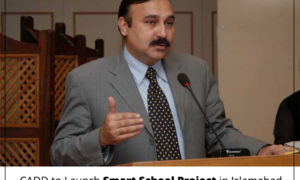Pakistan’s education system focuses strongly on primary education. However, there are still many children between five to nine years of age that are not attending school and it would appear that the primary system needs to expand if economic and educational goals are to be achieved.
Furthermore, the system’s ability to nurture young students who wish to continue their education beyond the primary and elementary level is relatively small, which has both economic and social implications for the country’s future.
Government’s Smart School Project (SSP)
Keeping in view the need to improve and upgrade the current educational system in the country, the federal government of Pakistan, under its Smart School Project (SSP), has decided to introduce new methods of learning based on modern approved practices.
The minister for Capital Administration and Development Division (CADD), Dr. Tariq Fazal Chaudhry, has ordered the up-gradation of about 24 schools in the federal capital, Islamabad. The minister made the announcement in a speech he delivered at the meeting of government officials and educational experts in Islamabad.
About The Smart School Project (SSP)
The Smart School Project (SSP) is based on the idea of Blended learning:
a formal education program in which a student learns at least in part through the online delivery of content and instructions.
Compared to the high-access environment, which simply provides devices for every student, blended learning includes an intentional transition to online instructional delivery for a portion of the day in order to enhance learning and productivity.
Initial Phase of SSP
In the initial phase of development, Smart School Project (SSP) will be implemented in 12 boys and 12 girls’ schools in Islamabad. Under the Smart School Project (SSP), the selected schools in the federal capital will be equipped with state-of-the-art technologies and upgraded smart classrooms that will ensure equal access to educational resources for all students.
The Smart School Project, supervised by government officials, will cover the children, eight to fourteen years old, especially from middle or low financial backgrounds. Dr. Tariq Fazal added:
“That technology-enabled education will provide an opportunity to address the gap in the quality of education in top private schools and public sector schools in Islamabad,”
Education is a fundamental human right and a key contributor in the development of children, communities, and societies. Opening classroom doors to all children, and introducing new learning methodologies, will help break the chains of poverty because education is directly linked to all development goals, such as reducing hunger, spurring economic growth, and building peace.
image: APP


